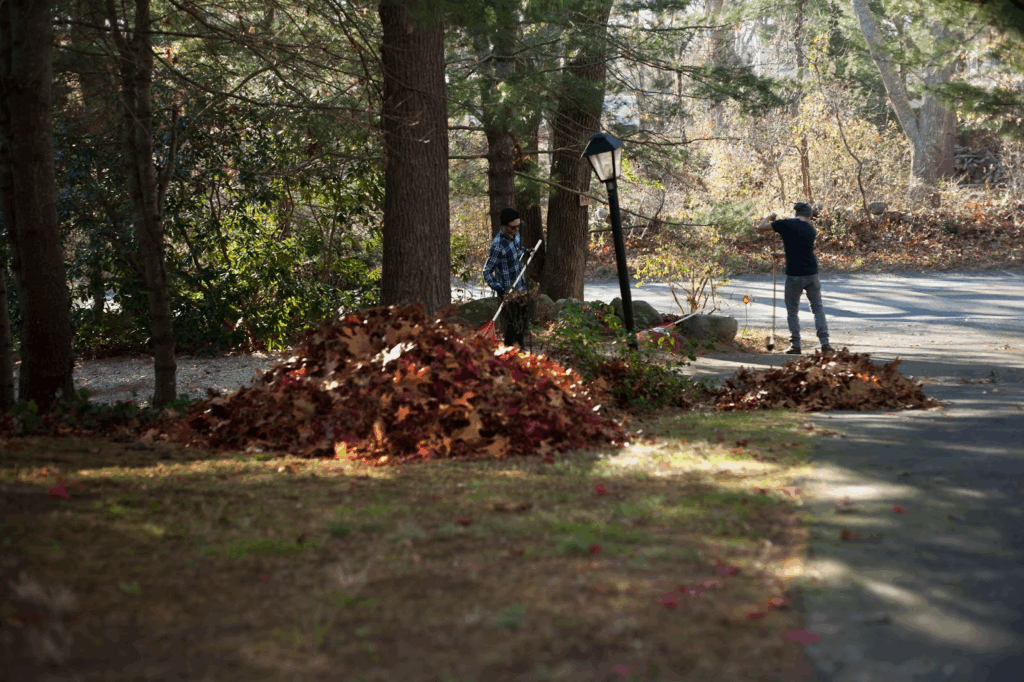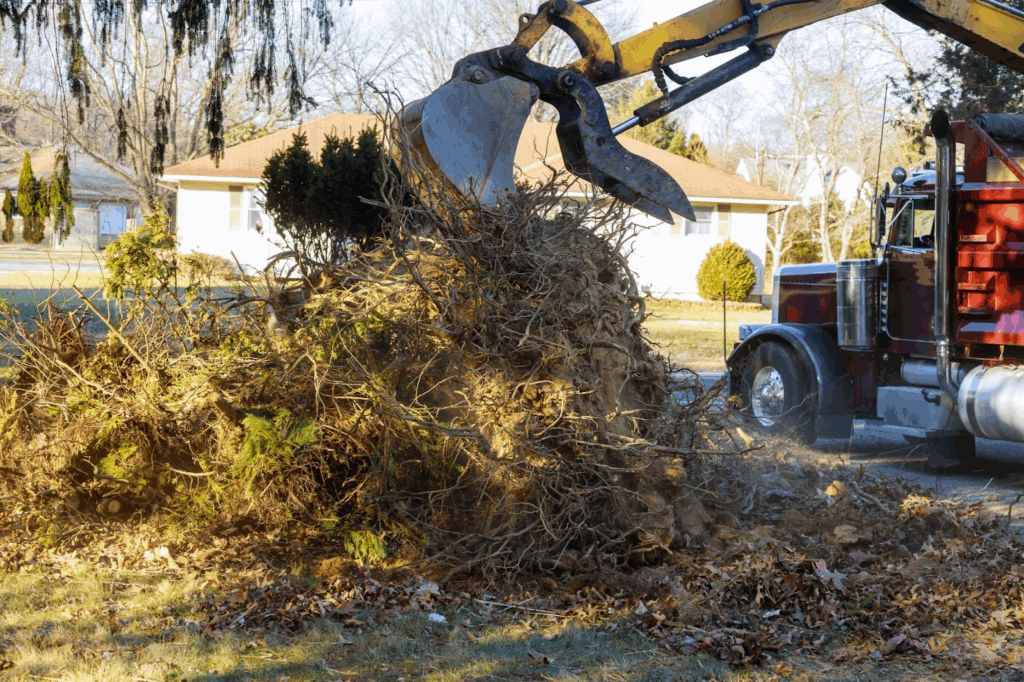A clean, organized commercial landscape reflects how a business operates behind the scenes. When someone arrives, it signals professionalism, care, and pride in the brand. When branches, leaves, or other debris pile up, they don’t just disrupt the view; they raise red flags about safety, efficiency, and maintenance standards. Regular landscaping debris removal helps businesses stay sharp, safe, and compliant.
Who Needs Commercial Landscape Debris Removal
Commercial debris removal isn’t just for large properties or high-end businesses. Office parks, shopping centers, restaurants, apartment complexes, warehouses, medical campuses, and even schools all generate landscape waste. Anywhere with outdoor walkways, green areas, or parking lot planters will see regular debris buildup. Property managers, business owners, and facilities directors rely on removal services to keep their grounds clean without diverting internal teams from their primary tasks. It’s necessary for businesses that want to stay sharp, safe, and compliant year-round.
Why Landscape Debris Removal Matters for Businesses
A well-kept property starts with what people see outside. Piled-up branches, leaves, or clippings can quietly damage your business image. But beyond appearance, unmanaged debris leads to safety issues and costly delays. Landscape debris removal is the first step to protecting your space and reputation.
Landscaping Debris Removal Prevents Safety Hazards
Debris on commercial grounds increases the risk of accidents. Wet leaves on walkways, hidden curbs under clippings, or broken branches near high-traffic areas create dangerous conditions for staff, visitors, and customers. These issues can lead to injury, insurance claims, or legal liability. Removing landscaping waste consistently keeps the property safer and more accessible.
Keeps Walkways and Entrances Clear
Commercial properties experience higher foot traffic than residential areas. Even a thin layer of mulch or damp leaves can turn smooth surfaces into slippery hazards. When walkways and entrances are cluttered, people are more likely to trip, slip, or fall. It puts businesses at risk of liability claims, especially in public-facing industries. Consistent removal of ground-level debris ensures that pathways remain safe and fully visible.
Lowers Risk of Pest-Related Hazards
Stacks of yard waste can attract insects, rodents, and even snakes. Once pests find shelter in unattended debris, they often migrate toward buildings. They pose significant health and business compliance risks, particularly in the food, healthcare, and retail sectors. Regular cleanup disrupts pest habitats before they become infestations. A clean exterior reduces the likelihood of needing expensive pest control services.
Minimizes Fire Dangers in Dry Seasons
Dry grass clippings, twigs, and leaves create fuel for fires. Especially in dry or windy climates, a single spark, from a cigarette, landscaping tool, or electrical source, can cause widespread damage. Fire-related incidents harm property, threaten lives, and cause costly downtime. Removing flammable materials regularly is part of responsible property management. It lowers the risk without requiring drastic changes to landscaping plans.
Commercial Curb Appeal Starts With Debris Removal
Landscaping debris removal directly affects how a business is perceived. Overgrown, messy, or unkempt outdoor areas suggest neglect, even if the business inside runs smoothly. First impressions influence clients, potential tenants, partners, and investors. Clean landscaping supports your brand and builds confidence in your operation.

Maintains a Professional Business Image
People often decide whether to trust a business before stepping inside. A cluttered parking lot or entryway makes your space look forgotten or uncared for. On the other hand, clean surroundings create a sense of order and pride. It shows visitors you pay attention to the small details, which builds credibility. For client-facing industries, this trust begins at the curb.
Highlights Your Landscape Design Features
Overgrowth or scattered debris hides the results, no matter how much you invest in design. Shrubs, hardscaping, flower beds, and pathways lose their visual impact when buried under clippings or fallen branches, undermining the purpose of your landscape upgrades. Routine clearing reveals the landscape’s lines, structure, and beauty and reinforces the property’s intended aesthetic.
Improves the Health of Grass and Plant Beds
Leaves and grass clippings block sunlight and trap excess moisture. Over time, this causes mold, fungi, and diseases in turf and decorative plants. When organic material sits too long, it chokes roots and reduces airflow, weakening the landscape from the ground up. Removing debris supports plant health and extends the life of your green spaces.
Clean Landscapes Streamline Property Operations
Debris removal isn’t just for looks; it supports smoother property operations. Maintenance becomes faster when your grounds are free of clogs and clutter, equipment lasts longer, and staff can focus on higher-value tasks. It creates real savings and improves consistency across the board.
Speeds Up Maintenance Tasks
Landscaping crews work faster when areas are clear. Debris slows mowing, edging, and trimming, adding labor hours and delays. It may also require special tools or prep work that wasn’t planned. By keeping grounds clean, routine maintenance becomes more straightforward and more predictable. Staff productivity increases, and budget overruns shrink.
Prevents Wear on Groundskeeping Equipment
Loose sticks, rocks, and leftover clippings damage lawn equipment. Debris dulls blades, clogs filters, and shortens motor life. Repairs and downtime can disrupt schedules and inflate costs. Regular cleanup reduces these risks and extends the lifespan of your tools. It also keeps your team working more safely and efficiently.
Reduces Time Spent on Emergency Fixes
Neglected debris often leads to surprise maintenance problems. Blocked drains, pest nests, or eroded walkways can appear suddenly and demand immediate, costly attention. Scheduling regular debris removal turns emergency tasks into planned maintenance. That saves money and avoids tenant or customer complaints. It’s a more innovative way to run property operations.
Debris Removal Supports Local Codes and Regulations
Many localities require commercial properties to meet visual and environmental standards. Debris buildup can violate zoning codes, lead to fines, and damage your business’s standing in the community. Proper disposal and maintenance keep you compliant and respected.
Avoids Penalties from Code Enforcement
Cities often require properties to maintain clean exteriors. Accumulated yard waste, blocked sidewalks, and unmanaged brush can trigger warnings or citations. Repeat offenses may lead to steep penalties or even business interruptions. Routine cleanup aligns your property with municipal expectations and demonstrates respect for shared public spaces.

Meets Environmental Waste Disposal Guidelines
Landscaping debris can’t always be dumped in standard trash bins. Municipal guidelines often separate organic waste, chemical-treated materials, and hard debris. Professional debris removal services know how to sort and dispose of each type responsibly. That strategy reduces contamination and supports local recycling programs. Responsible disposal helps your business meet its sustainability goals without extra effort.
Protects Drainage Systems and Soil Stability
Leaves, bark, and mulch quickly clog drains and gutters. When water can’t flow properly, it pools around foundations or erodes soil, damaging landscaping infrastructure, and nearby sidewalks or patios. Debris removal keeps water pathways open and soil in place, preventing bigger issues during storms and heavy rain.
Strategic Debris Removal Increases Property Value
A clean, functional landscape increases the long-term value of commercial property. It makes the space more attractive to buyers, tenants, and partners. Routine debris removal adds curb appeal, protects investments, and supports better use of space across seasons.
Makes Leasing and Sales Easier
Properties that look clean and move-in ready lease faster and sell for more. Landscaping is often a key factor in commercial real estate decisions. A cluttered yard can reduce interest, delay deals, or lower your asking price. By investing in debris removal, you maintain your asset’s full visual and financial value. That pays off in competitive property markets.
Increases Staff Comfort and Morale
Employees value the condition of the environment where they work. Outdoor spaces can be used for breaks, casual meetings, or enjoyed as views from inside. When these spaces are clean and inviting, people feel better at work. That leads to higher satisfaction and a stronger company culture. Debris-free areas make it easier for staff to take pride in their workplace.
Strengthens Brand Reputation
Landscaping is part of a brand’s presentation. A tidy, well-maintained property tells clients your business is dependable and detail-oriented. Messy surroundings, on the other hand, raise questions about how things run inside. Regular debris removal builds trust and reinforces professionalism. Your property becomes a visual proof of your brand values.
When to Schedule Landscape Debris Removal Services
There’s no one-size-fits-all timing for debris removal, but waiting too long creates problems fast. Most commercial properties benefit from scheduled service every one to two weeks during peak growing seasons. Same-day or next-day cleanup is often necessary after storms, special events, or large maintenance projects. Seasonal changes like fall and spring also increase debris that shouldn’t sit for a few days. Partnering with a service that understands your property’s rhythm helps avoid backlogs and liabilities before they surface.
Prioritize Landscape Debris Removal Before Issues Grow
Every piece of debris left behind becomes a silent liability. It chips away at your brand image, slows operations, and increases long-term costs. Clients may not say it, but they notice. Staying ahead of cleanup isn’t just maintenance but reputation management. The sooner your property reflects the standards you claim, the stronger your business position becomes.
Want insights that keep your property sharp and your team ahead? Explore the Top Dog Waste Solutions blog for straight answers that work.








